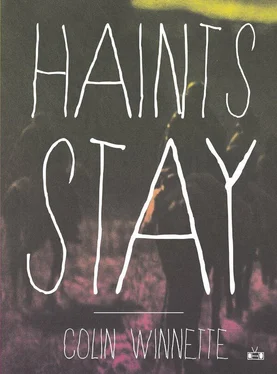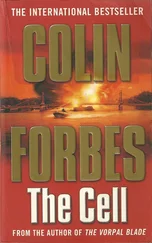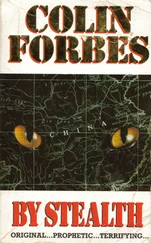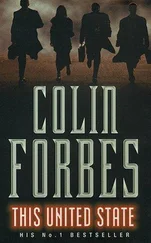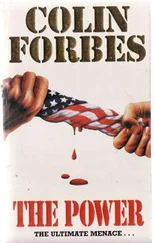“We are nearly out,” said Mary.
“Nearly,” said Bird.
“What will we do?”
“We’ll leave,” he said.
“Where will we go?”
“We.”
“I will go where you go,” said Mary.
“I’m going to follow the trail that brought us here.”
“That will lead us home,” she said.
“I will keep following it, on past the ranch where I was nursed, and I will hunt down the men who put me there.”
“John killed that thing,” said Mary.
“Not that thing,” said Bird.
“Then what?”
“The men who killed my family,” said Bird.
“Are you out of your wits? You’re acting stranger than I’ve yet seen you act.”
“I’m clear-headed,” said Bird, “and I’ve a simple plan that will guide me through the next period of my life.”
“A murderous plan?”
He nodded.
“I do not approve.”
“You don’t have to.”
“As long as you know.”
“I’ve always known,” said Bird. “You do not have to speak on it.”
“Known what?”
“That you don’t approve.”
“Of what?”
“Of me. Of my plans. Of the way I think of things.”
“How do you think of them?”
“You know clearly well how I think of them and what I expect of the world.”
“Horridness and dread.”
He did not respond.
“You expect only the worst.”
He did not respond.
“You do.”
“No. But I am prepared for the worst thing. I will work against the worst thing with everything I have within me.”
“Murderously.”
“Yes.”
“But murder is that worst thing you are preparing for.”
“No, it isn’t.”
“It is up there on the list of worst things then.”
“Depending on the circumstances, yes. John’s murder was a worst thing. The men who killed my family was a worst thing. The man who took Martha was a worst thing.”
“Do you know who killed your family?”
“Two men killed my family and brought me into the woods with them when I was much smaller than I am now. They tried to raise me or hold me hostage, but then they turned on me. I cannot remember everything. I will never be in that position again. I will fight that position with everything that’s within me.”
It was a line he’d drawn from one of the adventure books. There was a man who wore the same hat daily and fought evil with everything that was within him.
“You will die,” she said.
He nodded.
“And you are likely to do an accidental wrong.”
“Not if I pay attention,” he said. “And not if the world watches out for me.”
“These men,” said Mary. “What color were their hats?”
“They did not wear hats,” said Bird.
“What were their faces like? Did they have any scars?”
Bird shook his head. “I do not know.”
“How will you know them then?” she said.
“I will know the feeling of being near them.”
“I will not read you any more from those books,” she said.
“You have read enough.”
The next day, the sun broke finally from beneath the rooftop. It lit the edges of the room in which they slept. They woke to it. They wept. Time itself had freed them. They ate the jerky they had been saving. It was salty and tough, but a treat nonetheless. It stung the roofs of their mouths and puckered the edges of their lips. The sun. There it was. Mary sang a song about the sun. Bird practiced with his pistol.
Everything, then, seemed connected to her. When the snow stopped, it was because she had brought hope to the world. When the sun came out, it was to echo her filthy beauty. Brooke fed her from the desert and the stream and she held him. They did not walk together, but sat and let the snow vanish and the creek widen. The air was suddenly warm enough for exposed sleep. The stars were out. The sky was thick with them. Throughout the day, the moon was as clear as a treetop in the distance. She did not seem to sleep. She cried every so often. He slept on her, where she would let him. His head on a thigh, or a leg thrown over hers, if she was also sleeping. When she began to warble late in the night, he simply rolled away. She did not speak much. He told her what he’d found for them to eat, or how he’d caught it. Told her how to eat the spiny things, or the smallest creatures with the most delicate flavor. He was perfectly content to sit with her, day after day, in the mud and vanishing snow. It still sat atop the red rocks towering in the distance.
“Which way did you come from?” he asked. “Are we near a town?”
She shook her head.
“I was lost in the storm for some time before I found you,” she said.
That was heart-warming to him. The idea that, with him, she did not consider herself lost. He left it at that. He was eating no more than before, a little less, in fact, but he felt he was getting some of his old strength back. He felt he could last a little longer. That he wanted to last a little longer. He was curious what was in store for them. He imagined she would stay with him forever, seeing as it felt so right as it was.
She avoided locking eyes with the horizon. She kept her gaze on nearby things: her hands, the food he was providing, the water, the soles of her feet, the edges of the blanket. She was in no hurry to get anywhere, and that was more than fine to Brooke.
One night, he set a hand on the delicate tissue between her legs. She was on her back, her legs apart. He set his palm there, on the outside of her leggings. She did not react. He rotated his hand in a small circle, as he had done with Sugar, years before. She did not react. He kept it up, brought himself onto an elbow and leaned toward her. She was fixated on the clots of stars above them.
In the morning, he woke and she was gone. He was on the muddy blanket, alone and sweating in the sun. He heard voices, horses, active wood. He turned and discovered the wagon train, its carts and carriers still in a tight line, its travelers scattered across the landscape. Some were resting in the shadows of the wagons. Some were collecting water from the stream, passing around a cupped pan. There were four men and two women. The eldest of the group was of indeterminate age, a weathered old man sporting a beard and perched on a rock. They had a few mules and several horses, both harnessed and un-harnessed. He could not spot her. He gathered himself up and brought himself over to the older man sitting on a small rock beside several young men. Brooke tried to speak, but his voice was tired and unpracticed.
“I’ve been lost,” he said.
“We know,” said the older man. He put out his hand. “I’m the Pa here.”
“Hello, Pa.”
“My name is Wendell.”
“Hello, Wendell.”
“These are my boys: Jack, Marston, and Clay.”
Each of them had the man’s face at some previous stage. It was like standing before a row of daguerreotypes taken at ten-or twenty-year intervals. The youngest seemed about eighteen or so.
“Howdy,” said Brooke.
“Your wife’s in the wagon. She’s ill and needs to be cared for,” said Wendell.
“Which wagon?” said Brooke.
“That,” said Wendell.
Brooke shook the boys’ hands and nodded to Wendell and walked toward the far wagon containing the woman he’d met in the snow. He lifted himself on the wagon’s step and peered into the back.
An older woman and a child were at the woman’s side. The child was holding her hand and the older woman was mixing something in a small bowl.
“What’s she sick with?” asked Brooke.
“You must be John,” said the girl holding her hand.
Brooke nodded.
“Some kind of fever,” she said.
“She’ll be all right?” said Brooke.
They both nodded. The woman with the small bowl applied its contents to the sick woman’s lips. It was a red paste of some kind. From where Brooke stood, it had no smell.
Читать дальше
